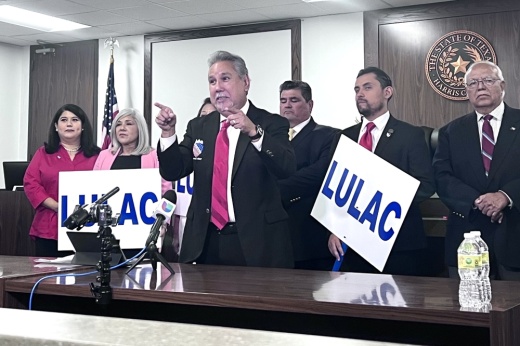The LULAC—which describes itself as an organization fighting for equal representation for the Latino community across the U.S.—said the lawsuit's goal is to eliminate at-large Houston City Council positions and create a council made up solely of single-member districts.
Passed in 1965, the Voting Rights Act outlawed discriminatory voting and election practices, including by eliminating poll taxes and literacy tests, among other measures.
As previously reported by Community Impact Newspaper, Houston has 16 council members, including five at-large positions and 11 single-member districts that cover a certain geographical area.
About 45% of Houston’s population is Latino, according to former LULAC District Director Augustin Pinedo, citing the most recent census data. However, there is only one Latino representative on Houston City Council, District I Council Member Robert Gallegos.
“It’s especially important to me, as the only Latino on the Houston City Council, that we grow the diversity of our council and have more representation across all levels of government, from school boards to Congress,” Gallegos said in an email to Community Impact Newspaper. “As our city grows and becomes more diverse, we must ensure communities of interest have the opportunity to elect representation that accurately reflects their voices and views.”
The lawsuit will be filed within the next 30 days, LULAC National President Domingo Garcia said. He said the LULAC has filed the same lawsuits in other major Texas cities, including Austin, Dallas, El Paso and San Antonio, and saw success. All four of those cities now have single-member districts, which was followed by increases in Latino representation on councils, he said.
Houston is now the outlier in Texas, Pinedo said.
“We are not getting a seat at the table; we’re getting the crumbs,” Pinedo said.
On top of the lawsuit, the LULAC will begin petitioning prior to the November elections with the goal of getting an item on the ballot to amend the city charter for all single-member districts as well as an expansion on the districts, Garcia said.
Mark Jones, a professor of political science with Rice University and a speaker at the town hall, said there are downsides to waiting on a ballot item to enact change. If LULAC seeks to place an item on ballots in 2023, the earliest the city could see change would be 2027, Jones said.
According to a statement from the city of Houston, the city is “committed to a fair and equal opportunity to all voters to elect council members of their choice.”
“A lawsuit filed before public presentation of the plan and analysis of historical voting patterns by city of Houston voters as applied to the city’s draft plan and any other proposed plan is premature,” the statement read. “The city welcomes input by LULAC and any other person or group as well as any analysis that supports such a person or group’s position and will give it careful consideration as council itself reviews and considers modifications to the upcoming draft plan.”
The city began a redistricting process in March—which is based on the most recent census—and a draft plan will soon be released for public consideration, the statement said.
“The city of Houston is currently undergoing the redistricting process, which is required before the city’s 2023 general election,” Gallegos said. “As that progresses, I urge our growing Latino community to remain engaged, active, and to be a leading voice in the process.”
Jeronimo Cortina, a political science professor with the University of Houston, said at the June 29 town hall that the Latino community also needs to hold themselves and their communities accountable by going out to vote. However, he said Latino voter turnout for the younger generation has increased dramatically.
“We need to have and to hold ourselves accountable in the sense that if we do not exercise our right to go out and vote, then that right is just something written on paper, something that does not necessarily mean anything,” Cortina said.





